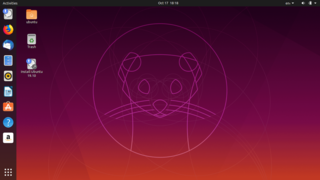Go Open Source was a campaign mainly concentrating on South Africa to create awareness of, educate about, and provide access to free/open-source software. The campaign was important in ensuring, once awareness of free and open source software was created, that interested parties had the ability to gain access to the software and services and that they have access to additional resources for support and training. The campaign contributed in planning for a transition to free/open-source software within the South African government. The campaign also launched the Geek Freedom League which is a group promoting free/open-source software to South Africa. As of May 2006 there are nearly 5000 South African members.
The campaign was launched by Mark Shuttleworth on behalf of Canonical, the CSIR's Meraka Institute, HP, and the Shuttleworth Foundation.
The Go Open Source campaign officially launched in May 2004 and completed its two-year run at the end of May 2006.

Free software or libre software is computer software distributed under terms that allow users to run the software for any purpose as well as to study, change, and distribute it and any adapted versions. Free software is a matter of liberty, not price: users—individually or in cooperation with computer programmers—are free to do what they want with their copies of a free software regardless of how much is paid to obtain the program. Computer programs are deemed free if they give users ultimate control over the software and, subsequently, over their devices.

The free software movement or free/open-source software movement or free/libre open-source software movement is a social movement with the goal of obtaining and guaranteeing certain freedoms for software users, namely the freedom to run the software, to study and change the software, and to redistribute copies with or without changes. Although drawing on traditions and philosophies among members of the 1970s hacker culture and academia, Richard Stallman formally founded the movement in 1983 by launching the GNU Project. Stallman later established the Free Software Foundation in 1985 to support the movement.

The GNU Project is a free software, mass collaboration project that Richard Stallman announced on September 27, 1983. Its goal is to give computer users freedom and control in their use of their computers and computing devices by collaboratively developing and publishing software that gives everyone the rights to freely run the software, copy and distribute it, study it, and modify it. GNU software grants these rights in its license.

Open-source software (OSS) is a type of computer software in which source code is released under a license in which the copyright holder grants users the rights to study, change, and distribute the software to anyone and for any purpose. Open-source software may be developed in a collaborative public manner. Open-source software is a prominent example of open collaboration.
Impi Linux was a South African Linux distribution which focused on the enterprise and government sector. The project name originally referred to Impi meaning war in the Zulu language. In September 2005, Mark Shuttleworth invested R10 million in return for 65% of Impi Linux.

Mark Richard Shuttleworth is a South African and British entrepreneur who is the founder and CEO of Canonical Ltd., the company behind the development of the Linux-based Ubuntu operating system. In 2002, he became the first South African to travel to space as a space tourist. He lives on the Isle of Man and holds dual citizenship from South Africa and the United Kingdom.

Ubuntu is a free and open-source Linux distribution based on Debian. Ubuntu is officially released in three editions: Desktop, Server, and Core. All the editions can run on the computer alone, or in a virtual machine. Ubuntu is a popular operating system for cloud computing, with support for OpenStack.

Canonical Ltd. is a UK-based privately held computer software company founded and funded by South African entrepreneur Mark Shuttleworth to market commercial support and related services for Ubuntu and related projects. Canonical employs staff in more than 30 countries and maintains offices in London, Austin, Boston, Shanghai, Beijing, Taipei, and the Isle of Man.

Open educational resources (OER) are freely accessible, openly licensed text, media, and other digital assets that are useful for teaching, learning, and assessing as well as for research purposes. There is no universal usage of open file formats in OER.

The English adjective free is commonly used in one of two meanings: "for free" (gratis) and "with little or no restriction" (libre). This ambiguity of free can cause issues where the distinction is important, as it often is in dealing with laws concerning the use of information, such as copyright and patents.

LinuxWorld Conference and Expo was a conference and trade show that focused on open source and Linux solutions in the information technology sector. It ran from 1998 to 2009, in venues around the world.
A Freedom Toaster is a public kiosk that will burn copies of free software onto user-provided CDs and DVDs.
Opposition to software patents is widespread in the free software community. In response, various mechanisms have been tried to defuse the perceived problem.

African Journals OnLine (AJOL) is a South African non-profit organisation dedicated to improving the online visibility of and access to the published scholarly research of African-based academics. It is headquartered in Grahamstown. By using the internet as a gateway, AJOL aims to enhance conditions for African learning to be translated into African development.
Proprietary firmware is any firmware on which the producer has set restrictions on use, private modification, copying, or republishing.
The open-source model is a decentralized software development model that encourages open collaboration. A main principle of open-source software development is peer production, with products such as source code, blueprints, and documentation freely available to the public. The open-source movement in software began as a response to the limitations of proprietary code. The model is used for projects such as in open-source appropriate technology, and open-source drug discovery.
The open-source-software movement is a movement that supports the use of open-source licenses for some or all software, a part of the broader notion of open collaboration. The open-source movement was started to spread the concept/idea of open-source software. Programmers who support the open-source-movement philosophy contribute to the open-source community by voluntarily writing and exchanging programming code for software development. The term "open source" requires that no one can discriminate against a group in not sharing the edited code or hinder others from editing their already-edited work. This approach to software development allows anyone to obtain and modify open-source code. These modifications are distributed back to the developers within the open-source community of people who are working with the software. In this way, the identities of all individuals participating in code modification are disclosed and the transformation of the code is documented over time. This method makes it difficult to establish ownership of a particular bit of code but is in keeping with the open-source-movement philosophy. These goals promote the production of high-quality programs as well as working cooperatively with other similarly-minded people to improve open-source technology. This led to software such as MediaWiki, the software with which the Wikipedia website is built.
The Shared Source Initiative (SSI) is a source-available software licensing scheme launched by Microsoft in May 2001. The program includes a spectrum of technologies and licenses, and most of its source code offerings are available for download after eligibility criteria are met.

Open Source Ecology (OSE) is a network of farmers, engineers, architects and supporters, whose main goal is the eventual manufacturing of the Global Village Construction Set (GVCS). As described by Open Source Ecology "the GVCS is an open technological platform that allows for the easy fabrication of the 50 different Industrial Machines that it takes to build a small civilization with modern comforts." Groups in Oberlin, Ohio, Pennsylvania, New York and California are developing blueprints, and building prototypes in order to pass them on to Missouri. The devices are built and tested on the Factor e Farm in rural Missouri. Recently, 3D-Print reports OSE has been experimenting with RepRap 3-D printers as suggested by academics for sustainable development.

Tactical Tech is an international nongovernmental organization that engages with citizens and civil-society organisations to explore and mitigate the impacts of technology on society.